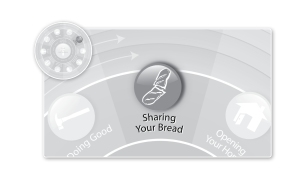Part I of our series on Sharing Your Bread
 This month, as we begin our study of the Work of Mercy of sharing your bread, the primary question we may find ourselves asking is “With whom?”
This month, as we begin our study of the Work of Mercy of sharing your bread, the primary question we may find ourselves asking is “With whom?”
With whom should I share my bread? My family? The poor? Strangers? Enemies?
But Jesus starts with a totally different question. Jesus’ question is: “From where?”
From where do we share our bread?
At first, that question doesn’t seem to make a lot of sense. But let’s look at John 6:1-58 and work through it section by section in order to understand why the question of “from where” is the most important question to ask when it comes to the Work of Mercy of sharing our bread:
Some time after this, Jesus crossed to the far shore of the Sea of Galilee (that is, the Sea of Tiberias), and a great crowd of people followed him because they saw the signs he had performed by healing the sick. Then Jesus went up on a mountainside and sat down with his disciples. The Jewish Passover Festival was near. When Jesus looked up and saw a great crowd coming toward him, he said to Philip, “Where shall we buy bread for these people to eat?” (John 6:1-5)
“From where” is the key question in the whole Gospel of John. As Brian Stoffregen notes, “If one knows the source of Jesus’ gifts, one comes close to recognizing Jesus’ identity.”
But “from where” isn’t even the second question we usually ask. The second question we usually ask when it comes to sharing our bread is, “How much is this going to cost?” And that’s how Phillip and the disciples respond to Jesus:
Philip answered him, “It would take more than half a year’s wages[a] to buy enough bread for each one to have a bite!”
Another of his disciples, Andrew, Simon Peter’s brother, spoke up, “Here is a boy with five small barley loaves and two small fish, but how far will they go among so many?” (John 6:7-9)
Do you see that when we ask, “How much?” we’ve already answered the question, “From where?” By asking the question that way it’s clear that we assume that the bread is clearly going to come from us and from our labor. That’s why Philip says, “This is gonna cost more than half a year’s wages!”
So, let me ask you a question: What word would you use to describe Jesus’ feeding these five thousand people? Or what word would you use to describe Jesus healing people or raising Lazarus from the dead?
We often use the word “miracle” for events like these, but Jesus doesn’t. Look at John 6:2 to see the word Jesus uses:
…and a great crowd of people followed him because they saw the signs he had performed by healing the sick.
So what’s the difference between a sign and a miracle?
A miracle is what we call something when we think about it from the physical perspective. Something is “miraculous” because it doesn’t operate according to the laws of the physical world.
So a miracle points to the physical world. But a sign points to somewhere else. A sign points beyond the physical realm. A sign is designed to lead people to ask, “From where is this sign coming?”
And that is the most important question that is raised by Jesus’ sign of feeding the five thousand: Where is this bread coming from?
How does the shift in thinking about Jesus feeding the 5,000 as a sign, and not a miracle, impact how you understand it? What does that change for you?











Pingback: Why Did Jesus Feed the 5,000? | Rev. Eric Foley
Pingback: Why Sharing Your Bread Cannot Be About Satisfying Hunger | Rev. Eric Foley
Pingback: What Protestant Christians (Should) Believe About the Lord’s Supper | Rev. Eric Foley